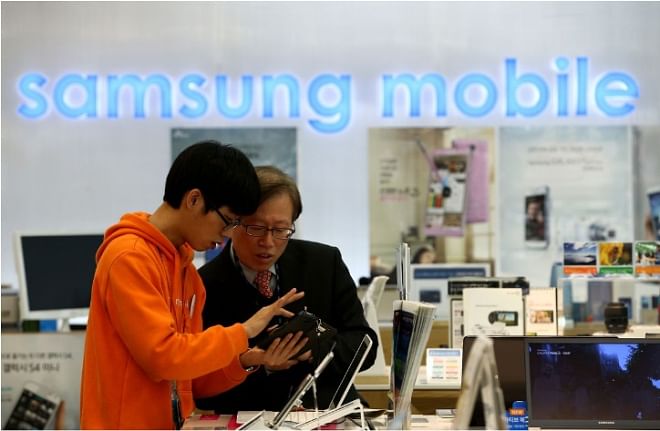Samsung eyes auto expansion as high-end smartphones slow

Samsung Electronics Co, which sells almost one of every three smartphones, wants to parlay that technology into automotive navigation and entertainment systems for an industry that makes more than 80 million vehicles a year.
Asia's biggest technology company is pushing beyond the hardware that underpinned its growth as global demand weakens for high-end handsets. Samsung is attending the International Consumer Electronics Show in Las Vegas this week along with a record nine carmakers, including Volkswagen AG's Audi unit and General Motors Co. (GM)
Businesses that reach from batteries and household appliances to memory chips, cameras and liquid-crystal displays provide components the Suwon, South Korea-based company can use inside automobiles. Samsung is partnering with Intel Corp on open-source software called Tizen that can run smartphones, tablets, TVs and car systems, and has garnered interest from automakers including Toyota Motor Corp, the world's biggest.
“In the past, passengers just used cars for moving, but now they want to enjoy entertainment and access to the Internet,” said Lee Seung Woo, an analyst at IBK Securities Co. in Seoul. “It's like a gigantic smartphone on wheels.”
Among the applications Lee expects in the future from Samsung are windows made of transparent flat-panels that provide map displays and other information for people inside the car while still enabling full visibility. It also may use sensors to monitor passengers' health, to select music to match a driver's mood and to analyze traffic and suggest a better route, he said.
Samsung declined to comment on its plans for the car sector, according to an e-mailed statement. The company is open to collaborations with automakers that could expand to include entertainment and navigation, President Hong Won-Pyo said by e-mail in October without elaborating.
Autos are set to be in the spotlight this year at CES, as carmakers look to catch consumer attention with new gadgetry in the cabins of their vehicles. Last year, more than 11,000 of the 150,000 attendees at the show described themselves as being in the automotive electronics business.
Samsung faces competition from chipmakers such as Freescale Semiconductor Ltd. that have historically supplied the auto industry and relative newcomers such as Qualcomm Inc, Nvidia Corp and Intel.
Qualcomm, whose radio chips are part of GM's Onstar service, and Nvidia, which supplies the processors for Tesla Motors Inc and Volkswagen AG's Lamborghini vehicles, are trying to bring elements already widely used in mobile phones to cars. Intel, the largest maker of personal-computer processors, supplies Tata Motors Ltd.'s Jaguar Land Rover and Hyundai Motor Co.
Samsung shipped a record number of handsets in 2013 and posted its highest quarterly earnings, yet its stock had its first annual decline in five years amid signs of slowing growth in high-end handsets and competition from Apple Inc's new iPhones.
Shares of the company, which reports preliminary fourth-quarter earnings tomorrow, rose 0.9 percent to 1,307,000 won in Seoul. The stock dropped 9.6 percent in the previous six trading days, a slump that erased about $19 billion of market value, or more than the capitalization of smartphone competitors HTC Corp, LG Electronics Inc. and BlackBerry Ltd. combined.
Samsung's market capitalization is about $181 billion, making it one of the 30 biggest companies in the world, according to data compiled by Bloomberg. Billionaire Chairman Lee Kun Hee on Jan. 2 urged Samsung's 236,000 workers to move beyond hardware and create new technologies, markets and business practices.
“We must give a bigger push for innovations,” Lee, South Korea's richest man, said in his New Year's speech to employees.
Samsung shipped 81.2 million smartphones in the third quarter, accounting for 31.4 percent of the global market, researcher IDC said in October. Apple shipped 33.8 million for 13.1 percent market share.
Global vehicle production was 79.3 million in 2013 and will reach 82.4 million this year, Morgan Stanley said in a Dec. 3 report. The average car contained about $330 worth of semiconductors in 2012, compared with $200 worth in 2002, market researcher IHS said in a Sept. 9 report.
By 2020, there will be about 152 million Internet-connected cars on the road, IHS Automotive said in a Nov. 19 report.
Google Inc.'s Android operating system has underpinned Samsung's growth into the world's largest smartphone maker, deploying the software on devices costing from less than $150 to more than $900. Yet Samsung has collaborated with companies including Vodafone Group Plc and Huawei Technologies Co. to develop Tizen.

 For all latest news, follow The Daily Star's Google News channel.
For all latest news, follow The Daily Star's Google News channel. 



Comments